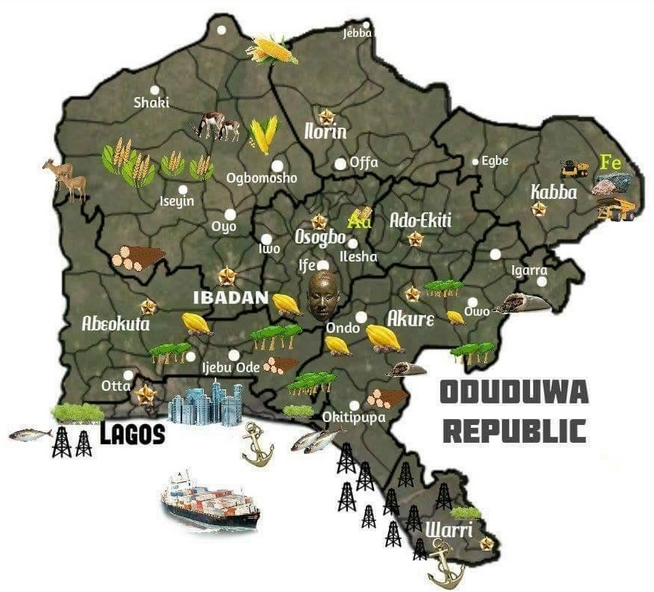
support@yorubalibrary.com
+2348073529208, 07038599574

The Yoruba people, predominantly located in southwestern Nigeria, have a rich history marked by the rise and fall of powerful kingdoms and empires. These historical entities played significant roles in shaping the political, cultural, and economic landscape of the region. This article looks into the history of notable Yoruba kingdoms and empires, highlighting their origins, achievements, and lasting legacies.
The Kingdom of Ife
Origins and Mythology
The Kingdom of Ife is considered the cradle of Yoruba civilization. According to Yoruba mythology, Ife is the birthplace of humanity, created by the deity Oduduwa. It is believed that Oduduwa descended from the heavens to establish the first Yoruba kingdom in Ife.
Cultural and Artistic Achievements
Ife is renowned for its remarkable contributions to art, particularly its intricate bronze and terracotta sculptures. These artifacts, dating back to the 12th century, reflect the sophisticated craftsmanship and artistic excellence of the Yoruba people.
Political Influence
Ife's political structure was based on a council of chiefs, with the Ooni of Ife serving as the spiritual and political leader. The kingdom's influence extended beyond its borders, with many subsequent Yoruba rulers tracing their lineage back to Ife.
The Oyo Empire
Founding and Expansion
The Oyo Empire, founded in the 14th century, emerged as one of the most powerful Yoruba states. It was established by Oranmiyan, a prince of Ife, who expanded the kingdom through military conquests and strategic alliances.
Administrative Structure
The Oyo Empire had a highly organized administrative system. At its core was the Alaafin of Oyo, the supreme ruler. The empire was divided into provinces, each governed by a local chief or Baale, who reported to the Alaafin. The empire also had a sophisticated system of checks and balances, exemplified by the Oyo Mesi, a council of noblemen who advised the Alaafin and ensured his powers were kept in check.
Military Prowess
The Oyo Empire's military strength was formidable, with a well-trained cavalry that played a crucial role in its expansion and defense. The empire's control over trade routes and its ability to levy tribute from conquered territories contributed to its wealth and power.
Decline
The decline of the Oyo Empire began in the late 18th century due to internal strife, rebellion, and external pressures from neighboring states and European colonizers. By the early 19th century, the empire had fragmented, leading to the rise of smaller, independent Yoruba states.
The Kingdom of Benin
Historical Connection
While primarily associated with the Edo people, the Kingdom of Benin had significant interactions with the Yoruba. Oral traditions suggest that the founders of the Benin Kingdom, were descendants of Oranmiyan from Ife. This connection highlights the interwoven histories of the Yoruba and Edo peoples.
Cultural Exchange
The Kingdom of Benin is famous for its bronze sculptures, similar to those of Ife. The artistic exchanges between Benin and Yoruba artisans enriched the cultural heritage of both regions.
The Kingdom of Ijebu
Economic Powerhouse
The Kingdom of Ijebu, located in the southeastern part of Yoruba land, was a major economic center. Known for its strategic position along trade routes, Ijebu controlled commerce between the hinterland and the coastal regions.
Political Structure
Ijebu had a unique political system led by the Awujale, the king, who governed with the assistance of a council of chiefs. The kingdom's political stability and economic prosperity made it an influential player in regional politics.
Resistance to Colonialism
In the late 19th century, the Kingdom of Ijebu resisted British colonial expansion. However, following a military confrontation in 1892, Ijebu was incorporated into the British colony, marking the end of its sovereignty.
The Ekiti and Ijesha Kingdoms
Ekiti
The Ekiti people, occupying the northeastern part of Yoruba land, were organized into several autonomous kingdoms. Each kingdom was governed by a traditional ruler known as the Oba. The Ekiti kingdoms were known for their fierce independence and resistance to external domination.
Ijesha
The Ijesha kingdom, located to the east of Ife, was known for its warriors and rich cultural traditions. The kingdom played a significant role in regional politics and was a key player in the wars of the 19th century that reshaped Yoruba land.
The Lagos Colony
Origins
The area now known as Lagos was originally a small Yoruba kingdom under the leadership of the Oba of Lagos. Due to its strategic location along the coast, Lagos became a significant center for trade, including the trans-Atlantic slave trade.
Colonial Era
In 1861, Lagos was annexed by the British and became a crown colony. This marked the beginning of a new era in Yoruba history, as British colonial rule gradually extended over the entire Yoruba land.
Conclusion
The history of Yoruba kingdoms and empires is a testament to the resilience, ingenuity, and cultural richness of the Yoruba people. From the ancient kingdom of Ife to the powerful Oyo Empire and the economically prosperous Ijebu Kingdom, these states played crucial roles in shaping the history and culture of the Yoruba. Their legacies continue to influence contemporary Yoruba society and contribute to the broader tapestry of African history.

Learn about the Yoruba concept of Ìwà Pẹ̀lẹ́ (good…

Learn special praises for Divine Being and Creator…